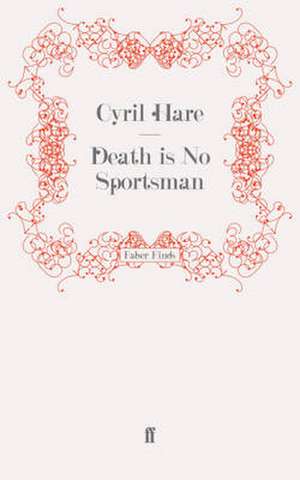Death is No Sportsman
en Limba Engleză Paperback – 11 mar 2011
The banks of the river Didder in the summertime seem, at first glance, idyllic: the sun is shining and the trout are rising. But then the body of a local landowner is discovered, and the peaceful surface of the countryside is shattered. It soon becomes apparent that there are quite a few local people who disliked the deceased man, but which one of them actually murdered him?
Inspector White, always deeply suspicious of the country, is brought in from Scotland Yard. Although quick to disentangle the complex relationships linking the suspects and the victim, it is only by mastering the subtleties of fly fishing that he uncovers the evidence to lead him to the killer.
Lovers of crime novels and fishing alike will delight in Hare's ingenious mystery, and the Daily Mail enthused upon original publication that 'the identity of the murderer is really a surprise'.
Preț: 137.10 lei
Nou
Puncte Express: 206
Preț estimativ în valută:
26.23€ • 27.49$ • 21.69£
26.23€ • 27.49$ • 21.69£
Carte tipărită la comandă
Livrare economică 07-14 aprilie
Preluare comenzi: 021 569.72.76
Specificații
ISBN-13: 9780571246434
ISBN-10: 0571246435
Pagini: 234
Dimensiuni: 135 x 216 x 17 mm
Greutate: 0.32 kg
Editura: FABER AND FABER LTD
Locul publicării:United Kingdom
ISBN-10: 0571246435
Pagini: 234
Dimensiuni: 135 x 216 x 17 mm
Greutate: 0.32 kg
Editura: FABER AND FABER LTD
Locul publicării:United Kingdom
Notă biografică
Cyril Hare was the pseudonym for the distinguished lawyer Alfred Alexander Gordon Clark. He was born in Surrey, in 1900, and was educated at Rugby and Oxford. A member of the Inner Temple, he was called to the Bar in 1924 and joined the chambers of Roland Oliver, who handled many of the great crime cases of the 1920s. He practised as a barrister until the Second World War, after which he served in various legal and judicial capacities including a time as a county court judge in Surrey. Hare's crime novels, many of which draw on his legal experience, have been praised by Elizabeth Bowen and P.D. James among others. He died in 1958 - at the peak of his career as a judge, and at the height of his powers as a master of the whodunit.
